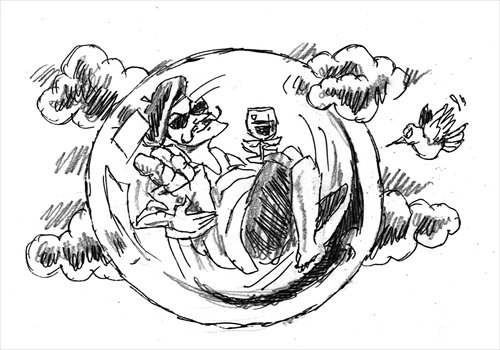Breaking out of the expat bubble

Illustration: Peter C. Espina/GT
When living abroad, it's easy to fall into the trap of surrounding yourself with what's familiar, at the expense of truly experiencing the host culture. Most expatriates do it at some point, searching out restaurants that serve food from their home country, shopping for familiar products and generally indulging - at whatever cost - in stuff that reminds the buyer of his or her native land.
Expat communities tend to club together for mutual benefit. This is why Chinatowns exist in New York, San Francisco and other cities around the world. It is also why many large, cosmopolitan cities around the world have areas that are largely occupied by a particular immigrant minority, whether it's Africans or Koreans, Russians or Turks.
People of a similar ethnicity, nationality or language naturally seem to be drawn to their tribal clans. As the saying goes, birds of a feather flock together. And so it seems to be with ethnic groups overseas. Probably we humans are just tribal by nature.
While the tendency to insulate oneself from the host culture by living inside an expat bubble is not unique to foreigners in China, I would argue that the nature of the comfy cocoon created by Westerners in Beijing has rather peculiar attributes.
The first of these, in my view, is an ongoing obsession with consuming high-end food, drinks and other goods. For instance, English-language magazines directed at Westerners (such as Time Out Beijing and The Beijinger) have a remarkable number of articles dedicated to food and drink, regularly filling around one third of their pages. Most of these articles consist of reviews and puff-pieces about expensive restaurants and bars. The cost of frequenting one of these places is far beyond the budget of most locals. The disproportionate amount of coverage devoted to this kind of luxury consumption speaks to a specifically Western lifestyle in Beijing.
Another curiosity of Western expats in Beijing, as compared to other such enclaves elsewhere, is the number of wannabe musicians, writers, fashion designers and other assorted artists one runs across here. In certain parts of the city (e.g. Gulou) it's difficult to walk down a hutong without stumbling across a Western-run ceramics studio, coffee-drinking artists' colony, or musicians' workshop.
While there's nothing wrong with such artistic enterprise in itself, it's the general lack of local flavor in the actual output and lifestyle that strikes me as odd. It's as if, apart from living in gentrified siheyuan courtyard houses (with luxury Western furnishings to match) and self-consciously riding a bicycle, these émigré artistes want as little to do with China as they can get away with.
It's natural to want to protect oneself by living in a cosy, familiar bubble. The majority of expats - myself included - do it to a great extent. However, the question that I want to ask is this: Isn't it high time the Western gourmands and artists of Gulou and Chaoyang made more of an effort to pop their expat bubble and experience the real China that lies both within, and beyond, the fifth ring road?
This article was published on the Global Times Metropolitan section Two Cents page, a space for reader submissions, including opinion, humor and satire. The ideas expressed are those of the author alone, and do not represent the position of the Global Times.